- Vitamin Supplements Market By Product Type (USD Billion, 2019-2035)
- Multivitamins
- Single Vitamins
- Vitamin Blends
- Vitamin Gummies
- Vitamin Supplements Market By Formulation (USD Billion, 2019-2035)
- Tablets
- Capsules
- Powder
- Liquid
- Vitamin Supplements Market By Distribution Channel (USD Billion, 2019-2035)
- Online Retail
- Pharmacies
- Supermarkets
- Health Stores
- Vitamin Supplements Market By End User (USD Billion, 2019-2035)
- Children
- Adults
- Pregnant Women
- Elderly
- Vitamin Supplements Market By Regional (USD Billion, 2019-2035)
- North America
- Europe
- South America
- Asia Pacific
- Middle East and Africa
North America Outlook (USD Billion, 2019-2035)
Vitamin Supplements Market by Product Type
Multivitamins
Single Vitamins
Vitamin Blends
Vitamin Gummies
Vitamin Supplements Market by Formulation Type
Tablets
Capsules
Powder
Liquid
Vitamin Supplements Market by Distribution Channel Type
Online Retail
Pharmacies
Supermarkets
Health Stores
Vitamin Supplements Market by End User Type
Children
Adults
Pregnant Women
Elderly
Vitamin Supplements Market by Regional Type
US
Canada
US Outlook (USD Billion, 2019-2035)
Vitamin Supplements Market by Product Type
Multivitamins
Single Vitamins
Vitamin Blends
Vitamin Gummies
Vitamin Supplements Market by Formulation Type
Tablets
Capsules
Powder
Liquid
Vitamin Supplements Market by Distribution Channel Type
Online Retail
Pharmacies
Supermarkets
Health Stores
Vitamin Supplements Market by End User Type
Children
Adults
Pregnant Women
Elderly
CANADA Outlook (USD Billion, 2019-2035)
Vitamin Supplements Market by Product Type
Multivitamins
Single Vitamins
Vitamin Blends
Vitamin Gummies
Vitamin Supplements Market by Formulation Type
Tablets
Capsules
Powder
Liquid
Vitamin Supplements Market by Distribution Channel Type
Online Retail
Pharmacies
Supermarkets
Health Stores
Vitamin Supplements Market by End User Type
Children
Adults
Pregnant Women
Elderly
Europe Outlook (USD Billion, 2019-2035)
Vitamin Supplements Market by Product Type
Multivitamins
Single Vitamins
Vitamin Blends
Vitamin Gummies
Vitamin Supplements Market by Formulation Type
Tablets
Capsules
Powder
Liquid
Vitamin Supplements Market by Distribution Channel Type
Online Retail
Pharmacies
Supermarkets
Health Stores
Vitamin Supplements Market by End User Type
Children
Adults
Pregnant Women
Elderly
Vitamin Supplements Market by Regional Type
Germany
UK
France
Russia
Italy
Spain
Rest of Europe
GERMANY Outlook (USD Billion, 2019-2035)
Vitamin Supplements Market by Product Type
Multivitamins
Single Vitamins
Vitamin Blends
Vitamin Gummies
Vitamin Supplements Market by Formulation Type
Tablets
Capsules
Powder
Liquid
Vitamin Supplements Market by Distribution Channel Type
Online Retail
Pharmacies
Supermarkets
Health Stores
Vitamin Supplements Market by End User Type
Children
Adults
Pregnant Women
Elderly
UK Outlook (USD Billion, 2019-2035)
Vitamin Supplements Market by Product Type
Multivitamins
Single Vitamins
Vitamin Blends
Vitamin Gummies
Vitamin Supplements Market by Formulation Type
Tablets
Capsules
Powder
Liquid
Vitamin Supplements Market by Distribution Channel Type
Online Retail
Pharmacies
Supermarkets
Health Stores
Vitamin Supplements Market by End User Type
Children
Adults
Pregnant Women
Elderly
FRANCE Outlook (USD Billion, 2019-2035)
Vitamin Supplements Market by Product Type
Multivitamins
Single Vitamins
Vitamin Blends
Vitamin Gummies
Vitamin Supplements Market by Formulation Type
Tablets
Capsules
Powder
Liquid
Vitamin Supplements Market by Distribution Channel Type
Online Retail
Pharmacies
Supermarkets
Health Stores
Vitamin Supplements Market by End User Type
Children
Adults
Pregnant Women
Elderly
RUSSIA Outlook (USD Billion, 2019-2035)
Vitamin Supplements Market by Product Type
Multivitamins
Single Vitamins
Vitamin Blends
Vitamin Gummies
Vitamin Supplements Market by Formulation Type
Tablets
Capsules
Powder
Liquid
Vitamin Supplements Market by Distribution Channel Type
Online Retail
Pharmacies
Supermarkets
Health Stores
Vitamin Supplements Market by End User Type
Children
Adults
Pregnant Women
Elderly
ITALY Outlook (USD Billion, 2019-2035)
Vitamin Supplements Market by Product Type
Multivitamins
Single Vitamins
Vitamin Blends
Vitamin Gummies
Vitamin Supplements Market by Formulation Type
Tablets
Capsules
Powder
Liquid
Vitamin Supplements Market by Distribution Channel Type
Online Retail
Pharmacies
Supermarkets
Health Stores
Vitamin Supplements Market by End User Type
Children
Adults
Pregnant Women
Elderly
SPAIN Outlook (USD Billion, 2019-2035)
Vitamin Supplements Market by Product Type
Multivitamins
Single Vitamins
Vitamin Blends
Vitamin Gummies
Vitamin Supplements Market by Formulation Type
Tablets
Capsules
Powder
Liquid
Vitamin Supplements Market by Distribution Channel Type
Online Retail
Pharmacies
Supermarkets
Health Stores
Vitamin Supplements Market by End User Type
Children
Adults
Pregnant Women
Elderly
REST OF EUROPE Outlook (USD Billion, 2019-2035)
Vitamin Supplements Market by Product Type
Multivitamins
Single Vitamins
Vitamin Blends
Vitamin Gummies
Vitamin Supplements Market by Formulation Type
Tablets
Capsules
Powder
Liquid
Vitamin Supplements Market by Distribution Channel Type
Online Retail
Pharmacies
Supermarkets
Health Stores
Vitamin Supplements Market by End User Type
Children
Adults
Pregnant Women
Elderly
APAC Outlook (USD Billion, 2019-2035)
Vitamin Supplements Market by Product Type
Multivitamins
Single Vitamins
Vitamin Blends
Vitamin Gummies
Vitamin Supplements Market by Formulation Type
Tablets
Capsules
Powder
Liquid
Vitamin Supplements Market by Distribution Channel Type
Online Retail
Pharmacies
Supermarkets
Health Stores
Vitamin Supplements Market by End User Type
Children
Adults
Pregnant Women
Elderly
Vitamin Supplements Market by Regional Type
China
India
Japan
South Korea
Malaysia
Thailand
Indonesia
Rest of APAC
CHINA Outlook (USD Billion, 2019-2035)
Vitamin Supplements Market by Product Type
Multivitamins
Single Vitamins
Vitamin Blends
Vitamin Gummies
Vitamin Supplements Market by Formulation Type
Tablets
Capsules
Powder
Liquid
Vitamin Supplements Market by Distribution Channel Type
Online Retail
Pharmacies
Supermarkets
Health Stores
Vitamin Supplements Market by End User Type
Children
Adults
Pregnant Women
Elderly
INDIA Outlook (USD Billion, 2019-2035)
Vitamin Supplements Market by Product Type
Multivitamins
Single Vitamins
Vitamin Blends
Vitamin Gummies
Vitamin Supplements Market by Formulation Type
Tablets
Capsules
Powder
Liquid
Vitamin Supplements Market by Distribution Channel Type
Online Retail
Pharmacies
Supermarkets
Health Stores
Vitamin Supplements Market by End User Type
Children
Adults
Pregnant Women
Elderly
JAPAN Outlook (USD Billion, 2019-2035)
Vitamin Supplements Market by Product Type
Multivitamins
Single Vitamins
Vitamin Blends
Vitamin Gummies
Vitamin Supplements Market by Formulation Type
Tablets
Capsules
Powder
Liquid
Vitamin Supplements Market by Distribution Channel Type
Online Retail
Pharmacies
Supermarkets
Health Stores
Vitamin Supplements Market by End User Type
Children
Adults
Pregnant Women
Elderly
SOUTH KOREA Outlook (USD Billion, 2019-2035)
Vitamin Supplements Market by Product Type
Multivitamins
Single Vitamins
Vitamin Blends
Vitamin Gummies
Vitamin Supplements Market by Formulation Type
Tablets
Capsules
Powder
Liquid
Vitamin Supplements Market by Distribution Channel Type
Online Retail
Pharmacies
Supermarkets
Health Stores
Vitamin Supplements Market by End User Type
Children
Adults
Pregnant Women
Elderly
MALAYSIA Outlook (USD Billion, 2019-2035)
Vitamin Supplements Market by Product Type
Multivitamins
Single Vitamins
Vitamin Blends
Vitamin Gummies
Vitamin Supplements Market by Formulation Type
Tablets
Capsules
Powder
Liquid
Vitamin Supplements Market by Distribution Channel Type
Online Retail
Pharmacies
Supermarkets
Health Stores
Vitamin Supplements Market by End User Type
Children
Adults
Pregnant Women
Elderly
THAILAND Outlook (USD Billion, 2019-2035)
Vitamin Supplements Market by Product Type
Multivitamins
Single Vitamins
Vitamin Blends
Vitamin Gummies
Vitamin Supplements Market by Formulation Type
Tablets
Capsules
Powder
Liquid
Vitamin Supplements Market by Distribution Channel Type
Online Retail
Pharmacies
Supermarkets
Health Stores
Vitamin Supplements Market by End User Type
Children
Adults
Pregnant Women
Elderly
INDONESIA Outlook (USD Billion, 2019-2035)
Vitamin Supplements Market by Product Type
Multivitamins
Single Vitamins
Vitamin Blends
Vitamin Gummies
Vitamin Supplements Market by Formulation Type
Tablets
Capsules
Powder
Liquid
Vitamin Supplements Market by Distribution Channel Type
Online Retail
Pharmacies
Supermarkets
Health Stores
Vitamin Supplements Market by End User Type
Children
Adults
Pregnant Women
Elderly
REST OF APAC Outlook (USD Billion, 2019-2035)
Vitamin Supplements Market by Product Type
Multivitamins
Single Vitamins
Vitamin Blends
Vitamin Gummies
Vitamin Supplements Market by Formulation Type
Tablets
Capsules
Powder
Liquid
Vitamin Supplements Market by Distribution Channel Type
Online Retail
Pharmacies
Supermarkets
Health Stores
Vitamin Supplements Market by End User Type
Children
Adults
Pregnant Women
Elderly
South America Outlook (USD Billion, 2019-2035)
Vitamin Supplements Market by Product Type
Multivitamins
Single Vitamins
Vitamin Blends
Vitamin Gummies
Vitamin Supplements Market by Formulation Type
Tablets
Capsules
Powder
Liquid
Vitamin Supplements Market by Distribution Channel Type
Online Retail
Pharmacies
Supermarkets
Health Stores
Vitamin Supplements Market by End User Type
Children
Adults
Pregnant Women
Elderly
Vitamin Supplements Market by Regional Type
Brazil
Mexico
Argentina
Rest of South America
BRAZIL Outlook (USD Billion, 2019-2035)
Vitamin Supplements Market by Product Type
Multivitamins
Single Vitamins
Vitamin Blends
Vitamin Gummies
Vitamin Supplements Market by Formulation Type
Tablets
Capsules
Powder
Liquid
Vitamin Supplements Market by Distribution Channel Type
Online Retail
Pharmacies
Supermarkets
Health Stores
Vitamin Supplements Market by End User Type
Children
Adults
Pregnant Women
Elderly
MEXICO Outlook (USD Billion, 2019-2035)
Vitamin Supplements Market by Product Type
Multivitamins
Single Vitamins
Vitamin Blends
Vitamin Gummies
Vitamin Supplements Market by Formulation Type
Tablets
Capsules
Powder
Liquid
Vitamin Supplements Market by Distribution Channel Type
Online Retail
Pharmacies
Supermarkets
Health Stores
Vitamin Supplements Market by End User Type
Children
Adults
Pregnant Women
Elderly
ARGENTINA Outlook (USD Billion, 2019-2035)
Vitamin Supplements Market by Product Type
Multivitamins
Single Vitamins
Vitamin Blends
Vitamin Gummies
Vitamin Supplements Market by Formulation Type
Tablets
Capsules
Powder
Liquid
Vitamin Supplements Market by Distribution Channel Type
Online Retail
Pharmacies
Supermarkets
Health Stores
Vitamin Supplements Market by End User Type
Children
Adults
Pregnant Women
Elderly
REST OF SOUTH AMERICA Outlook (USD Billion, 2019-2035)
Vitamin Supplements Market by Product Type
Multivitamins
Single Vitamins
Vitamin Blends
Vitamin Gummies
Vitamin Supplements Market by Formulation Type
Tablets
Capsules
Powder
Liquid
Vitamin Supplements Market by Distribution Channel Type
Online Retail
Pharmacies
Supermarkets
Health Stores
Vitamin Supplements Market by End User Type
Children
Adults
Pregnant Women
Elderly
MEA Outlook (USD Billion, 2019-2035)
Vitamin Supplements Market by Product Type
Multivitamins
Single Vitamins
Vitamin Blends
Vitamin Gummies
Vitamin Supplements Market by Formulation Type
Tablets
Capsules
Powder
Liquid
Vitamin Supplements Market by Distribution Channel Type
Online Retail
Pharmacies
Supermarkets
Health Stores
Vitamin Supplements Market by End User Type
Children
Adults
Pregnant Women
Elderly
Vitamin Supplements Market by Regional Type
GCC Countries
South Africa
Rest of MEA
GCC COUNTRIES Outlook (USD Billion, 2019-2035)
Vitamin Supplements Market by Product Type
Multivitamins
Single Vitamins
Vitamin Blends
Vitamin Gummies
Vitamin Supplements Market by Formulation Type
Tablets
Capsules
Powder
Liquid
Vitamin Supplements Market by Distribution Channel Type
Online Retail
Pharmacies
Supermarkets
Health Stores
Vitamin Supplements Market by End User Type
Children
Adults
Pregnant Women
Elderly
SOUTH AFRICA Outlook (USD Billion, 2019-2035)
Vitamin Supplements Market by Product Type
Multivitamins
Single Vitamins
Vitamin Blends
Vitamin Gummies
Vitamin Supplements Market by Formulation Type
Tablets
Capsules
Powder
Liquid
Vitamin Supplements Market by Distribution Channel Type
Online Retail
Pharmacies
Supermarkets
Health Stores
Vitamin Supplements Market by End User Type
Children
Adults
Pregnant Women
Elderly
REST OF MEA Outlook (USD Billion, 2019-2035)
Vitamin Supplements Market by Product Type
Multivitamins
Single Vitamins
Vitamin Blends
Vitamin Gummies
Vitamin Supplements Market by Formulation Type
Tablets
Capsules
Powder
Liquid
Vitamin Supplements Market by Distribution Channel Type
Online Retail
Pharmacies
Supermarkets
Health Stores
Vitamin Supplements Market by End User Type
Children
Adults
Pregnant Women
Elderly


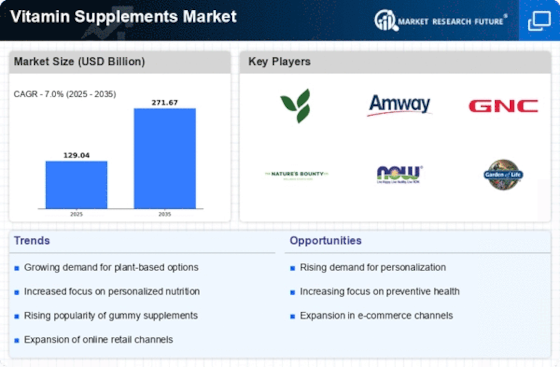

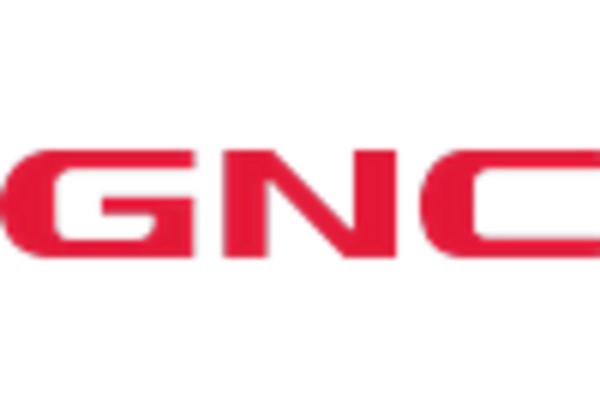
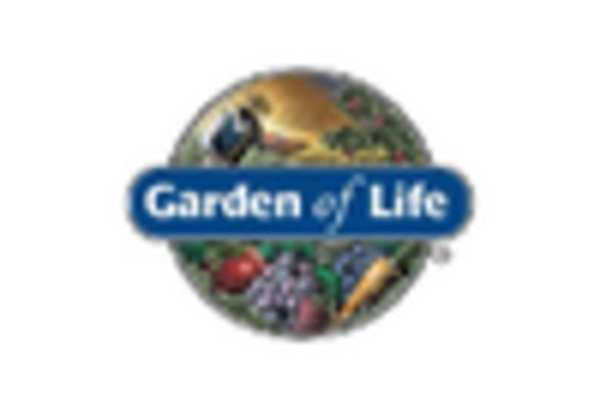

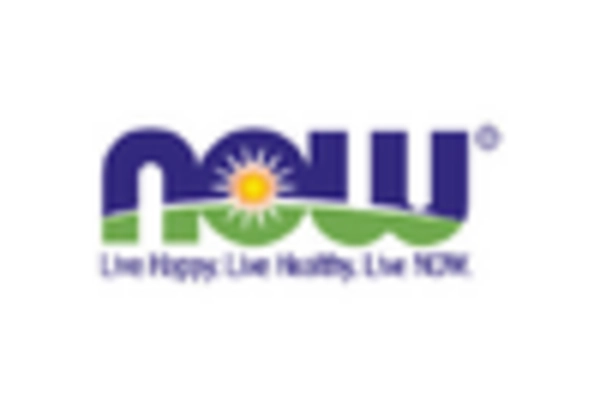
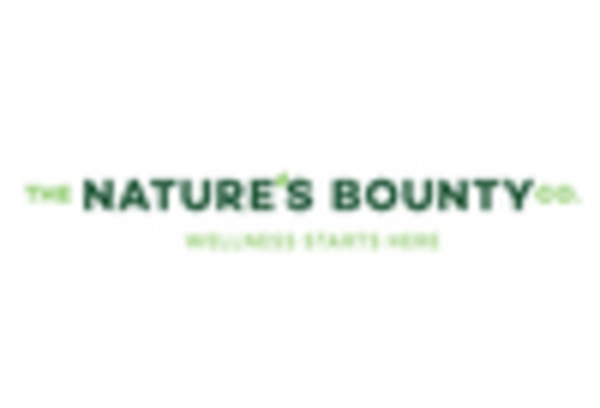










Leave a Comment